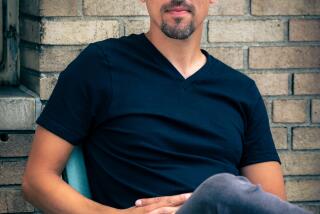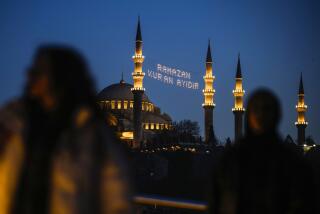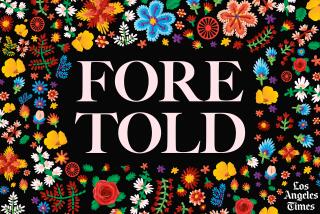In Cairo, keeping a musical tradition alive
- Share via
Reporting from Cairo — “Magdi, Magdi,” the kid yells, running in off the street.
A bottle of water flies up to the loft and Magdi Ali catches it and shouts thanks. The child disappears through the sawdust and back into the sunlight. Ali scrapes his planer, pale curls weightless as snow tumble around his sandals, his glue pot simmers on a stove. He tightens strings of copper and silk until the pluck-pling of ancient music rises from his worn hands and drifts out the door.
A single note. Then it vanishes.
“I don’t play, really, I just make.”
Ouds. He has made thousands over the years. A stringed instrument with a shell shaped like a polished turtle, it’s the Arabic cousin of the lute. Its rhythms and laments have played through the centuries, from caravans to palaces to the orchestras of belly dancers and divas. It was once as prevalent as the call to prayer, a sound engrained, especially here on Mohammad Ali Street, where musicians reigned until they began slipping away years ago to clubs and cabarets out near the pyramids.
The oud makers stayed. Ali works in the Gamil Georges shop, founded in 1906 in a brick building with a wrought iron arch. Georges is dead and his son is 86 and doesn’t come in so much anymore. The red and white letters spelling out Gamil Georges on the window are fading. The shop is pretty much run these days by Ali and Eid Mohamed, filling orders from France, Bahrain, the United Arab Emirates, Australia and the guy in Texas who requests two ouds each year.
Mohamed works downstairs, unfinished ouds of beechwood, oak and mahogany tacked up by the dozens on walls of grit and dust. Ali, who Mohamed says is the best oud maker there is, rules the loft, climbing a ladder, scrunching through a passageway and then standing in the breeze of ceiling fans. Ali had his own shop, but says taxes, bureaucracy and the “unsecure nature of Egypt’s musical industry” led him here a decade ago.
He prefers not to talk when he works, hovering over his bench, his untucked shirt swaying, his dark eyes narrowing, focusing on his tools and wood that seems to float through his fingers. His ouds sell for $100 to more than $1,000, depending on the quality of wood and intricacy of design. The company pays him $5 for each one. He must be doing all right, though; he smokes Western cigarettes, not the cheaper local Cleopatras.
A man who makes instruments is sensitive to change, the way the world shifts beyond his steel wool and chisels. There are fewer calls for his handiwork coming in from cities and deserts across the Middle East. It’s nerves, wars, the whims of global finance, all those newspaper stories the men read in the teahouse next door. The sweet things in life, the ones that show us the better part of ourselves, he thinks, get tucked away and sometimes forgotten against the worry of living.
“The turning point was the first Gulf War in 1991. Orders began to drop,” says Ali, who was born in the Nile Delta but raised in these alleys. “Most of our clients were from gulf countries. They once had the money and the mood. They loved music. Some didn’t even play, but they’d buy five ouds just to hang in their homes. But after two wars and stresses and politics, they grew insecure and lost the mood.”
A veiled woman strolls into the shop with a boy. Mohamed pulls down a finished oud, shining amber and brown, the color of tree sap. He shows another and another. Fingers strum the 11 strings, dance up the oud’s neck to its bent nose. The woman and the boy leave, handing back an instrument inspired millennia ago by Lamak, the sixth grandson of the biblical Adam and a direct descendant of Cain.
This music goes back to the pharaohs, says Mohamed, his work clothes streaked with months of stains. “The most important thing is the balance between neck and nose. This must be precise or the sound is off and any musician would hear such an imperfection. My father was ultra-religious. He forbade music and never listened to it. He would never have approved of my making ouds. I had to wait until he died.”
The oud, which in Arabic means “wood,” lent a storied legacy and an unmistakable sound to the era of composers and musicians such as Mohamed Abd Elwahab, Farid Atrash and Umm Kulthum, the Egyptian singer with the sunglasses whose voice played for decades on radios across the Arab world.
“You can barely find an Egyptian song with an oud anymore,” says Ali, 46. “It used to be every Arab composer would begin with the oud, sounding out his song. Now, it’s all electric and technology music. This mingling of the oud with Western computer music, it’s not Arabic, it’s not Western. I don’t know what it is but it’s not for me. I listen to the old stuff.”
He pauses, he planes.
“The oud has lost its glamour.”
Mohammed Ali Street has lost a bit of its charm too. Ali walks it every day, past melon sellers and cellphone boys, through alleys of furniture makers, upholsters and shopkeepers eating lunches from silver bowls or escaping to the shade to read the Koran and calm the clatter of hammers, saws, craftsmen and fast-talkers making promises and sharing water from clay jugs. European facades flake, balustrades crumble and the modern has crept in with lithium batteries and the beep-hum of text messages.
“There’s not so much music on the street anymore,” Ali says.
He first came here as a boy. He studied the oud makers and learned about lacquer and mother-of-pearl inlays. He began in the trade when he was 20 and completed his first oud, from start to finish with no help, when he was 25.
He plucks strings, but never had an inclination to play; making ouds, he says, is work and work should be left in the shop. Sweat running through his thinning black hair, Ali follows the grain and texture of beech and oak, smoothing, always smoothing.
“It grows in front of my eyes, like a child,” he says. “With every piece, it is like this.”
He planes, stirs the glue pot.
Mohamed slips out for an errand. The shop is quiet, a half-eaten lunch sits next to a bottle of olive oil, wearing-home clothes hang brightly on a nail, all else covered with dust as if the desert had blown in and receded.
Ali bends over his work bench, his pale, cracked palms the color of stripped wood. He blows on the planer’s blade. Curls fall at his feet.
Amro Hassan in The Times’ Cairo Bureau contributed to this report.
More to Read
Sign up for Essential California
The most important California stories and recommendations in your inbox every morning.
You may occasionally receive promotional content from the Los Angeles Times.













